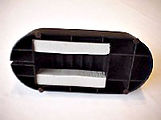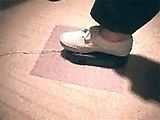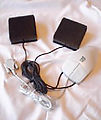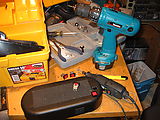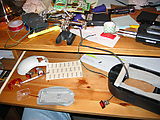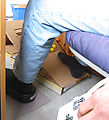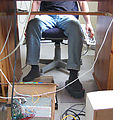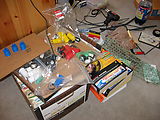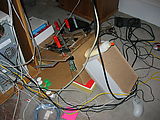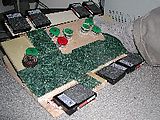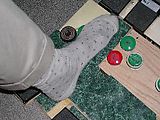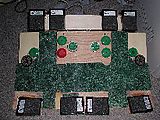Foot Mouse & Foot Keyboard
Offloading some computer control from my hands to my feet was a major component of my plan to my repetitive strain pain problems .
Foot Mouse
My first step was to find a footmouse . I purchased a FootRat (now discontinued). The FootRat enclosed a standard ball mouse in a foot-sized platform, and wired in two external foot switches for left-click and right-click.
A related idea I read about was the NoHands Mouse — a product I avoided because it uses a tilt-controlled velocity-based mouse-positioning system (like the mini "nub" joystick found on an IBM Thinkpad laptop) rather than a position-based one. Still, the NoHands Mouse is worth a look.
Perhaps an even better idea is simply to place an optical mouse upside down and slide your foot over it like this guy did ! The only complication is that you would need to reverse one of the two axes in software.
I still use my FootRat today. I eventually upgraded the mouse to an optical mouse (stands up better to dust & dirt), and customized the foot platform to include onboard left and right buttons — so I could use my other foot for my foot keyboard! My main problem today with the FootRat is that after months of use, the bottom scuffs and wears, eventually becoming stiffer to move. I've played with using various furniture sliders, with mixed results. I will soon experiment with using tiny ball casters.
The most promising product I currently know of is the Footime Foot Mouse , which is also available at Amazon.com .
Foot Keyboard
I built this foot keyboard so I can use my right foot for some of my most common key presses: arrow keys, "back button" (web browsing), enter, and page up & down. You can see my modified FootRat foot mouse on the left, and my DataHand keyboard .
It was constructed from the guts of a USB keyboard, and video game buttons mounted in a cardboard frame. Yes, it's ugly — but I never found it worth my time to clean it up. I've been using it every day for almost a decade now.
I was inspired by Nils Klarlund's foot keyboard setup.


